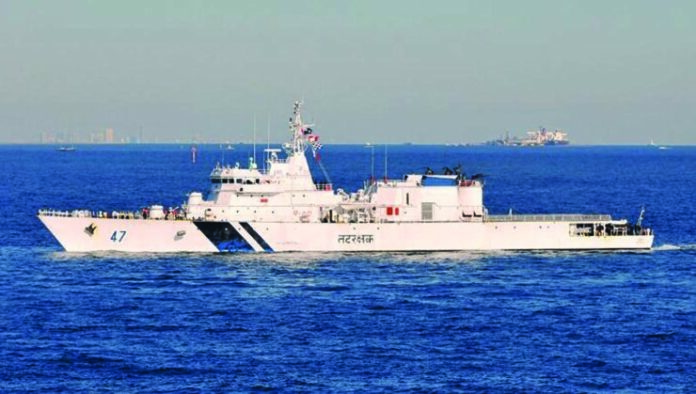Table of Contents
Understanding Indian Coast Guard Officer
An Indian Coast Guard (ICG) officer is a commissioned officer in the Indian Coast Guard. It is a multi-mission organization responsible for enforcing maritime laws and regulations, protecting India’s maritime interests, and safeguarding the country’s coastlines and offshore areas.
Indian Coast Guard officers are responsible for the command and control of ICG vessels, aircraft, and shore facilities and they play a vital role in ensuring the safety and security of India’s maritime domain.
Indian Coast Guard officers are appointed through various entry schemes like direct entry, NDA, CDS SSC (Short Service Commission), and Permanent Commission. They are trained for some time in the Indian Coast Guard Academy, Indian Naval Academy, and other training institutes.
The Indian Coast Guard officer’s duties include search and rescue operations, maritime law enforcement, marine pollution response, coastal security, and assisting in natural disasters. They also work closely with other government agencies, such as the Indian Navy and the Indian Customs Service, to carry out their mission.
They are responsible for the safety and security of India’s coastlines, ports, and offshore oil and gas installations. They are also responsible for search and rescue operations, pollution control, and maritime law enforcement.
INDIAN RAILWAYS : POSTS VACANT FOR APPRENTICES, DETAILS HERE
Decoding the Roles of Indian Coast Guard Officer
Indian Coast Guard officer stands for Indian Coast Guard officer, An Indian Coast Guard (ICG) officer is responsible for enforcing maritime laws and regulations, protecting India’s maritime interests, and providing aid in times of natural disasters and other emergencies.
Some of the specific duties and responsibilities of an ICG officer include:
- -Patrolling and monitoring India’s coastlines, ports, and offshore oil and gas installations to ensure safety and security.
- -Conducting search and rescue operations in the event of a maritime emergency.
- -Controlling and preventing maritime pollution.
- -Enforcing maritime laws and regulations, such as those related to fishing and shipping.
- -Providing aid and assistance during natural disasters and other emergencies.
- -Conducting maritime surveillance using ships, aircraft, and other equipment.
- -Providing security for India’s Exclusive Economic Zone (EEZ) and maritime boundaries.
- -Participating in joint operations with other maritime agencies and navies.
- -Providing support to other government agencies, such as the police and Customs.
- -Undertake various roles such as Executive officer, navigating officer, Engineer officer, Electronics officer, and Flight officer(if trained)
- -ICG officers are commissioned officers and are responsible for the overall management and operation of ships, aircraft, and other equipment used by the Indian Coast Guard. They may also be responsible for training and supervising junior officers and enlisted personnel.
- – ICG officers may be assigned to various positions, such as commanding officer of a ship or aircraft, executive officer of a Coast Guard station, or staff officer in a headquarters or regional command.
In addition to these operational roles, ICG officers also have administrative and management responsibilities such as managing personnel and resources, planning and executing operations, and maintaining records and reports.
In summary, Indian Coast Guard officers play a crucial role in protecting India’s maritime interests and providing aid in times of natural disasters and other emergencies.
They are responsible for enforcing maritime laws and regulations, conducting search and rescue operations, controlling and preventing maritime pollution, and providing security for India’s Exclusive Economic Zone (EEZ) and maritime boundaries.
They are also responsible for managing personnel and resources, planning and executing operations, and maintaining records and reports. These are the activities and roles of an ICG officer.
A Glimpse into the Indian Coast Guard Officer’s Environment
The workplace of an Indian Coast Guard (ICG) officer can vary depending on their specific role and assignment.
However, some common elements of an ICG officer’s workplace include:
>>Ships and boats: Many ICG officers spend a significant amount of time on board ships and boats, patrolling and monitoring India’s coastlines, ports, and offshore oil and gas installations. They may also be responsible for commanding these vessels and overseeing the crew.
>>Aircraft: Some ICG officers may also be trained as pilots and navigators and can fly aircraft, which are equipped with advanced technology to support maritime operations.
>>Coast Guard stations: ICG officers may also be assigned to coast guard stations located along India’s coastlines. These stations serve as a base of operations for patrols, search and rescue operations, and other missions.
>>Headquarters and regional commands: Some ICG officers may be assigned to headquarters or regional commands, where they may be responsible for planning and executing operations, managing personnel and resources, and maintaining records and reports.
>>Outdoors: ICG officers will be working outdoors for most of the time, either on ships, boats, or aircraft, during patrols, surveillance, and search and rescue operations.
>>High-stress environment: As an ICG officer, you may be required to work in high-stress environments, such as during natural disasters or emergencies, and may be required to make quick and critical decisions.
>>Shift Work: ICG officers may work long hours, including overnight and weekend shifts, depending on the nature of their assignment and the operational requirements of the Indian Coast Guard.
Overall, the workplace of an ICG officer is challenging and dynamic and requires a high level of physical and mental fitness, discipline, and teamwork. They must be able to adapt to changing situations, work well under pressure, and make quick decisions in emergencies.
The Average salary of an ICG officer
The average salary of an Indian Coast Guard (ICG) officer can vary depending on their rank and experience, but generally, ICG officers are well compensated. The salary structure of ICG officers is similar to the pay scales of officers in the Indian Navy and Indian Army. They receive a salary, perks, and other benefits as per the 7th pay commission.
Here is an approximate breakdown of the salary for different ranks in the Indian Coast Guard:
- Assistant Commandant:
The starting rank for an ICG officer is Assistant Commandant. The basic pay for an Assistant Commandant is around Rs. 56,100 per month.
- Deputy Commandant:
As an officer progresses in their career and is promoted to the rank of Deputy Commandant, their basic pay increases to around Rs. 67,700 per month.
- Commandant:
Upon reaching the rank of Commandant, an ICG officer can expect to earn a basic pay of around Rs. 78,800 per month.
- Additional Director General:
At the highest rank of Additional Director General, an ICG officer can earn a basic pay of around Rs. 1,44,200 per month.
It is important to note that these figures are approximate and may vary depending on the individual’s experience and qualifications. Additionally, ICG officers also receive several other benefits and perks, such as housing, medical facilities, transport facilities, and other benefits in line with the 7th pay commission.
Skills to be an ICG officer:
Indian Coast Guard is one of the most challenging jobs to do. Becoming an Indian Coast Guard (ICG) officer requires a combination of physical fitness, education, and personal attributes. Here are some of the key skills and qualifications that are required to be an ICG officer:
- Physical fitness:
ICG officers are required to pass a physical fitness test, which includes a swim test, a run test, and a push-up and sit-up test. They should be able to swim at least 1.5km in the open sea in full uniform within 20 minutes.
- Leadership:
ICG officers are expected to lead by example and take charge in difficult and stressful situations. They must be able to inspire and motivate others to work as a team.
- Decision-making:
ICG officers are often required to make quick and critical decisions in emergencies. They must be able to analyze a situation and make the best decision for the safety of themselves and others.
- Communication:
ICG officers must be able to communicate effectively with a diverse group of people, including crew members, other agencies, and members of the public.
- Technical and navigation skills:
ICG officers are responsible for operating and maintaining ships, boats, and aircraft. They must be proficient in navigation, meteorology, and ship handling.
- Education:
ICG officers are required to have at least a Bachelor’s degree in any discipline from a recognized university. They are also required to pass a written examination and a personality test.
- Discipline and integrity:
ICG officers are held to a high standard of personal conduct and must be able to maintain discipline and integrity in all situations.
- Willingness to serve:
ICG officers are expected to be willing to serve the nation and put their safety at risk for the safety and security of others.
Moreover, these are general qualifications and requirements, the specific qualifications and requirements for joining the Indian Coast Guard may vary depending on the specific role or program you are applying for.
INDIAN-ORIGIN WOMAN POLICE OFFICER SETTLES SCOTLAND YARD RACISM CASE
Why should one pursue a career as an ICG Officer?
There are several reasons why someone may choose to pursue a career as an Indian Coast Guard (ICG) officer:
>>Sense of purpose:
Serving in the ICG offers the opportunity to protect and serve the nation and its citizens. ICG officers have the opportunity to make a positive impact on the community and the country as a whole.
>>Adventure and excitement:
A career in the ICG offers the opportunity for adventure and excitement. As an officer, you will have the opportunity to operate ships, boats, and aircraft, navigate in the open sea, and take part in various operations and exercises.
>>Professional development:
The ICG offers a range of opportunities for professional development and career advancement. Officers can pursue higher education, attend specialized training programs, and advance to higher ranks and positions of responsibility.
>>Job security:
The ICG is a government organization and as such offers job security and stability. ICG officers can also expect to receive a competitive salary and benefits package.
>>Sense of camaraderie:
The ICG is a tight-knit community of officers, and as an officer, you will have the opportunity to develop strong relationships with your colleagues.
>>Opportunities to travel:
As an ICG officer, you will have the opportunity to travel to different parts of the country, and the world, as part of your duties.
>>Respect and honor:
ICG officers are held in high regard and are respected members of the community. They are honored for their service to the nation and for putting their own lives at risk to protect others.
On the other hand, it is important to note that being an ICG officer also involves risks, long working hours, and time away from family. It also requires to be in good physical and mental shape, if you are ready for that and willing to serve the nation and its citizens, then becoming an ICG officer could be a rewarding and fulfilling career choice. So, if you can face all the challenges and if you love your country and want to do something for the country then you should pursue a career in the Indian Coast Guard!















